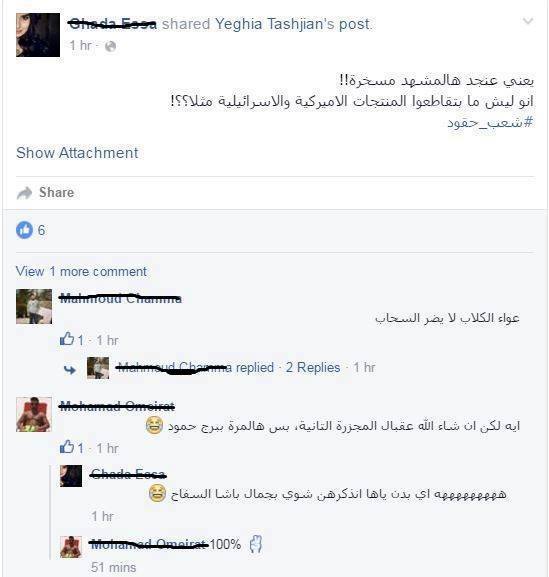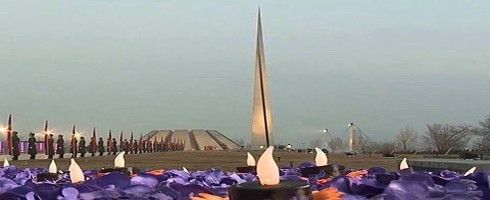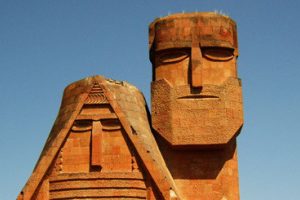While Lebanese-Armenians continue to commemorate the anniversary of the Armenian Genocide, the Lebanese are still debating the tragic event on social media.
The Racism and sectarianism that is flourishing on daily basis in the region is also reflected in Lebanon. While some look at tragic events from a humanitarian angle, others view them through a sectarian lens. Worse, some crimes are even being justified.
Last year on the anniversary of the Armenian Genocide there was some “sectarian drama” on Lebanese social media. This year’s anniversary was not very different. Although a large number of Lebanese people showed solidarity with the Armenians by raising awareness and sharing posts, such as “Je suis Armenien,” a small group decided to use social media to bully the victims of the genocide and glorify the criminals, which was very concerning.
Something similar happened last year; some people replaced their profile pictures with the image of a Turkish flag while others posted selfies taken in front of the Turkish flag in solidarity with Turkey and the Ottoman Empire.
Meanwhile, in Tripoli, Turkish flags were raised and a campaign was organized to express “solidarity with Turkey”. A couple of days ago, the same attitude began to spread again. In response to the Lebanese-Armenian Youth Federation’s calls to boycott the sale of Turkish products in the Burj Hammoud area, some reacted to this call in a racist manner. Not surprisingly, once again the same racist and sectarian hysteria spread like wildfire. Some of the comments made on social media included:

Anti-Armenian hate comments on Facebook
“Let them go back to Armenia and boycott Turkish products.”
“They need another massacre, but this time in Burj Hammoud.”
“Someone should remind them of Jamal Pasha the butcher.”
“They are strangers and will remain strangers even if they stay here for 1000 years.”
“They rebelled and the Ottoman Empire punished them…”
What worried me the most was the last “comment”. Here, there was no denial of the crime, but a justification of it. This is similar to the genocide of the Yazidis in Iraq, where ISIS supporters also justified their crimes by claiming that the Yazidis were “devil worshipers” who need to be “eradicated from the land of Islam.” As it is known, a genocide ignored yields genocide repeated. The more people deny and justify crimes against humanity, the more it encourages perpetrators to commit massacres. Wasn’t it Adolf Hitler who stated, before ordering his soldiers to invade Poland in 1939, “Who after all remembers the annihilation of the Armenians?”
On the other hand, many Lebanese activists showed solidarity with the cause. Some shared stories, linking the Armenian genocide to the current massacres in Syria and Iraq, while others compared it to the Palestinian Nakba (exodus).
Others reminded their fellow Lebanese citizens that Lebanon’s parliament has already recognized and condemned the Armenian genocide. Thus, the genocide is gaining recognition and is raising the public’s awareness through campaigns on social media. People are becoming aware of not just the past, but also the crimes that are being committed against ethnic and religious minorities today. It is important to educate people about such crimes so that together we can prevent genocide and ethnic-religious cleansings.
Lastly, we need to remind some that the Armenian Genocide cannot be viewed from a Christians vs. Muslim angle, which is how some are trying to portray it. The proof is that the Ottoman government persecuted Kurdish Yazidis and Alevis during the same era. Sharif Hussein’s decree, issued in 1917, called on Muslims to protect Armenians and other Christian minorities, which is another example of how many Muslims showed their solidarity with the Armenians. The decree noted:
“…What is requested of you is to protect and to take good care of everyone from the Jacobite Armenian community living in your territories and frontiers and among your tribes; to help them in all of their affairs and defend them as you would defend yourselves, your properties and children, and provide everything they might need whether they are settled or moving from place to place, because they are the Protected People of the Muslims…”
Yeghia Tashjian holds a B.A. in political science from Haigazian University in Beirut, Lebanon. He is a Lebanese-Armenian political activist, researcher, blogger and the founder of the New Eastern Politics forum/blog. Currently, he is the regional officer of Women in War, a gender-based think tank. You can follow the author on Twitter @yeghig.
Original source: https://now.mmedia.me/lb/en/blogs/566923-the-armenian-genocide-solidarity-vs-denial







